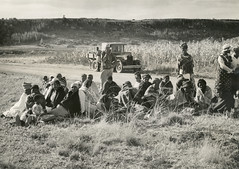Serendipity is the gift of finding useful things unexpectedly by luck, and it is amazing how often you find important stuff by browsing as well as by searching.
My route to Paul Duguid's October 2006 essay Limits of self-organisation: peer-production and the "laws of quality" was via Alfred Essa's The NOSE and Nicholas Carr's Rough Type, where there is a thorough and readable review of the essay.
Like a lot of others I was strongly influenced by Duguid and Seely Brown's 1999 book The Social Life of Information. Duguid's argument in the essay, which echoes Stephen Weber in The Success of Open Source is that there are particular conditions pertaining in Open Source software production, that "see to the quality", which do not necessarily exist in "open source knowledge generation". (Weber's specific points are, roughly: that software has to work in a specific technical contex; that whether it works well, or whether a new version is an improvement on an earlier one, can be objectively judged; and that within Open Source software development there is usually a complex heirarchy of control. For more on this see this brief December 2005 review in (old style) Fortnightly Mailing and this extract from the book's final chapter, in which Weber lists the sorts of tasks for which he thinks an open source process
is more likely to work effectively, and the circumstances in which
those involved in an open source process are likely to be motivated to
contribute.)
I hope that the abstract of Duguid's essay:
"People often implicitly ascribe the quality of peer–production projects
such as Project Gutenberg or Wikipedia to what I call “laws” of
quality. These are drawn from Open Source software development and it
is not clear how applicable they are outside the realm of software. I
look at examples from peer production projects to ask whether faith in
these laws does not so much guarantee quality as hide the need for
improvement."
and the conclusion to Carr's review:
"But one comes away from this excellent paper wondering whether, once these "other ways" of quality assurance are imposed on a process, it would still qualify as "peer production." As Duguid eloquently demonstrates, quality doesn't just happen; it's not an emergent phenomenon. It's imposed on a work by people who know what they're doing. Quality - true quality - may thus be incompatible with the democratic ideal that lies at the heart of what we call peer production."
encourage you to read both of them.



Open University "OpenLearn": MIT with pedagogy, or MIT without the completeness?
From the Hewlett Foundation's Open Educational Resources – Making High Quality Educational Content and Tools Freely Available on the Web
In March I reported on the Open University's announcement that it would be making some of its content "open", supported by a large grant from the William and Flora Hewlett Foundation. In July I included a summary from a presentation I attended by Jason Cole and Martin Dougiamas about the OU's use of Moodle. Since then progress has been swift and impressive.
On 25/10/2006, the OU launched OpenLearn "free and open educational resources for learners and educators around the world". [Hewlett Foundation media release.] Yesterday I heard a presentation to the HEFCE "eLearning Partnership Board" (on which I represent ALT) by Professor David Vincent, who is the OU pro Vice Chanceller responsible for the initiative.
Continue reading "Open University "OpenLearn": MIT with pedagogy, or MIT without the completeness?" »
Posted on 28/10/2006 in News and comment | Permalink | Comments (1)
|